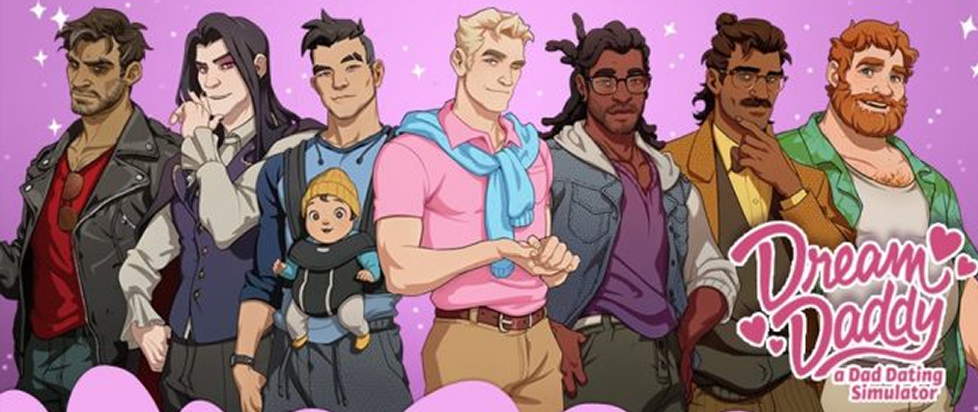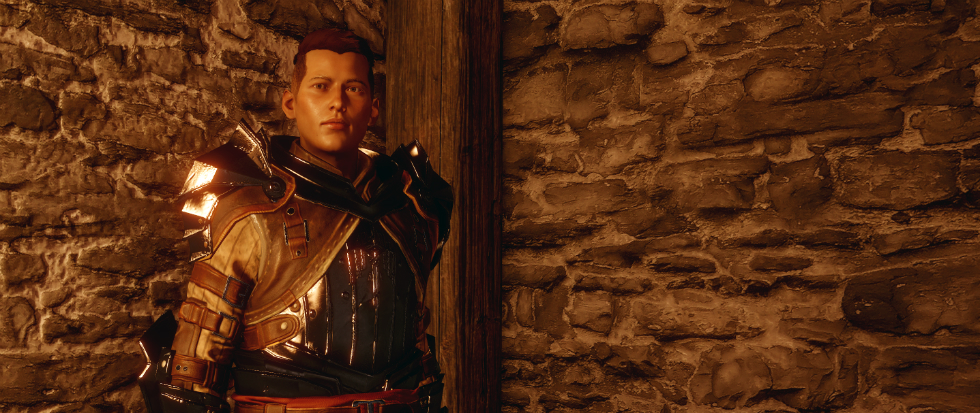
The Gay Normalcy Fantasy
Games can make us powerful beyond human reckoning in all kinds of different fantastical worlds both realistic and not. The “power fantasy” is a common argument for games as escapism, as they let us step into shoes with more power than we feel like we have in the real world, a way to escape into a life that can affect change in spectacular fashion and live in a “better” world for a while. Usually when we talk about this phenomenon, we look at it through the prism of the straight white male. It’s where the bald space marine archetype came from, for one. But gay game fantasies can take on completely different shapes, imagining very different realities that reinterpret the meaning of the word “power” that are nonetheless just as valuable as your standard power fantasy is. One particularly powerful example of this is Dream Daddy, which gives power to gay people by imagining a world in which homosexuality is the status quo.
The sad truth is that, despite having gained much in the way of rights and acceptance, we still live in a society that marginalizes the gay community. Gay people are still the target of scorn from the more conservative, religious-minded populous and are thus treated as pariahs or, worse, targets for abuse. Entire churches build their message around the idea that God hates gay people. Parents are more than willing to disown and throw out their kids for being gay, and those same kids make up a sizable chunk of the percentage of people who are homeless. This has always been the reality that gay people might have to face, but though it’s gotten better in many places across the country, the message is still the same no matter what circumstances you find yourself in: Being gay is not normal.
The status quo is straight. If you’re not straight, you’re not normal. Straight is assumed to be the default setting in life, and you only need to turn on the television to see the evidence. Love stories are all heterosexual love stories, commercials portray families as firmly heterosexually led. Homosexual displays of affection are treated as salacious, while the same straight displays are fawned over. This is what is meant when people say that certain groups are “othered”, shunted to the side as outsiders, weirdoes, or deviants. In this light, the desire for a sense of normalcy is understandable.
Dream Daddy, a dating game where you, a gay dad, engage in homosexual relationships with other dads, shines by centering gayness in a way that flips the status quo on its head by making homosexuality the default. The game plays on the well-worn trope of a suburban neighborhood full of families, except here the twist is that those families are all headed by single dads that you can date. Nobody bats an eye at the rampant homosexuality. On the contrary, it’s treated as completely normal, and oftentimes encouraged. One storyline with a dad involves your daughter and his daughter conning you both to meet up unexpectedly, another trope that is completely unchanged save for the fact that the couple the kids are trying to get together is gay. It’s a revelation to witness gayness being the default and seeing life just go on as normal in every other way.
But it also provides a sort of normalcy fantasy for gay folks who maybe didn’t have that normal of a life. At its heart, Dream Daddy is a game about courtship, a rite of passage that’s been codified into the status quo of life, but one that assumes heterosexual participation. It’s also something that many never grew up with due to being othered just by being gay. For gay people who didn’t grow up with normal love lives because of varying degrees of ostracization, it’s comforting to disappear into a game that lets you live that perfectly normal ritual vicariously through your created dad character. It allows us to explore gay relationships through a “normal” lens to see what it would look like if society were different.
In assuming a world where gayness is centered, though, all the prejudices and bigotry that are often thrown at gay people are completely papered over. It does indeed create a false narrative around the gay experience. But that’s entirely the point. Not every piece of queer media has to represent the entirety of what it is to be queer, and Dream Daddy fulfills a very specific function: escapism. Now escapism has become somewhat of a dirty word in games criticism, but the ability to escape to another reality isn’t inherently bad or unhealthy. Sometimes we need that to clear our heads and act as a panacea for all the poison that the world slings at us. Stepping into a better world makes us powerful, and in turn can allows us to bring some of that power back with us to the real world. And in Dream Daddy’s case, cutting away all the horrible things life throws at us gay people can give us clarity and insight into gay relationships and how they start and blossom. That’s amazing, and worth escaping to for a while.
Gay people have to put up with so much of the world’s crap that we deserve somewhere to escape to when reality gets too much. Games are keenly good at fulfilling that function, and Dream Daddy gives us our “power fantasy”, except here it’s the societal power not to be considered castouts. It’s a world worth exploring, and by idealizing it, it gives us something to work toward: A world where heterosexuality is not the default, and the homosexual experience can be considered its own kind of normal.





